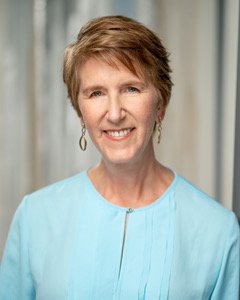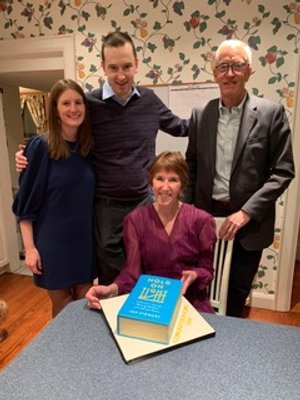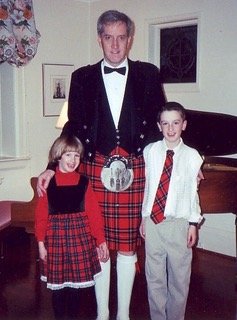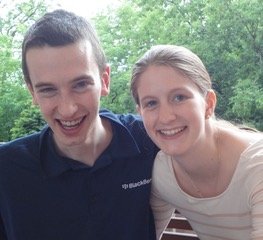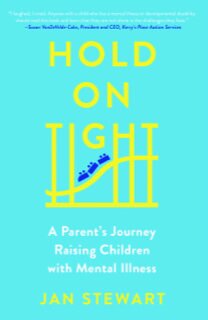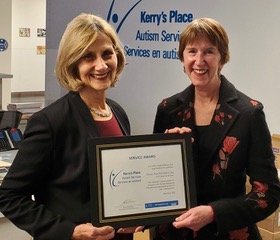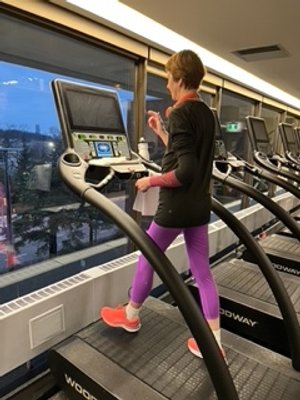Unsinkable Resilience & the Importance of Self-Care Raising Neurodivergent Children
Author: Jan Stewart
TW: This Unsinkable story discusses Tourette Syndrome, Obsessive Compulsive Disorder, autism, ADHD, learning disabilities, and severe mood and anxiety disorders. We invite our community to read it only if it's the right time for them. If you're struggling, please reach out to the Crisis Text Line or Kids Help Phone.
.
.
.
Merriam-Webster’s definition of “Unsinkable” is “incapable of being sunk”. Synonyms include “resilient”, “valiant” and “unwavering”. Many people have told me that I embody the word, and if that is true, it is because of my extraordinary children.
As a white, educated upper-middle-class woman of privilege, I never imagined the challenges to come once my husband and I had children. We naively assumed that life would continue on, as expected, as long as we worked hard and were kind, caring people. We naively assumed that life would not throw us any real hardballs. And we naively assumed that our children would follow in the same successful pattern as ours.
But almost immediately after our son Andrew and then our daughter Ainsley were born, we “knew” in our guts that something wasn’t right. And ever since then, it’s been a harrowing journey. We were terrified by Andrew’s daily sudden eruptions into two-hour frightening meltdowns for no apparent reason. We despaired when he started engaging in bizarre, non-stop compulsive rituals, ranging from him not being able to walk through a door for 30 minutes and sweeping the ground with his hands for hours at a time to rubbing his head repeatedly against car mirrors and poles. We were drained by Ainsley’s behaviour, which became so out of control and disruptive at school that she was constantly sent to the principal’s office. We were frightened by her overwhelming anxiety. And we silently wept for her when her inability to read her friends’ social cues led her to gradually lose all of her neighbourhood friends.
But I am an ambassador of hope and resilience. I have never been afraid to face fear, and I didn’t waver. I promised the children we would never settle until we found them the right help. And I always keep my promises.
We had to work hard to counter our doctor’s repetitive discounting of our concerns as excessively worried parents who just needed to calm down. We had to work hard to navigate our overly complex healthcare system and find the right healthcare providers for the children and obtain the proper diagnoses: Andrew with autism, Tourette Syndrome, Obsessive Compulsive Disorder, ADHD and learning disabilities, and Ainsley with Tourette Syndrome, ADHD, learning disabilities and severe mood and anxiety disorders. We had to work hard to find schools willing to truly partner with us and, as the children became adults, to find inclusive and accommodating employers. We’ve faced new challenges at every stage, from complications with co-occurring conditions to decades-long waitlists for supportive housing. And we’ve had to learn to recalibrate relationships with certain family members and friends in the face of fear, misunderstandings and stigma.
I am resilient, but I am not infallible. No one is. There have been times when I have felt helpless, frightened, frozen, isolated and alone. When would we climb out of the abyss? Would we ever see the light? My future would never include a happy, carefree retirement in the warm sun or extensive travelling. What did I have to look forward to?
And I paid for the debilitating stress in my life with my health. I have always been thin and kept up with fitness, but my eating became unhealthy, either skipping meals or grabbing ice cream and candy to get me through each day. I am convinced that my eating, combined with the unrelenting pressures in my life, undoubtedly contributed to my diagnosis of stage 3 breast cancer 13 years ago as well as to additional health issues, including ongoing kidney problems, high blood pressure, osteoporosis and long-term back problems. I sometimes half-joke that if stress is a major determinant of stroke, I should have died years ago.
It was finally after experiencing these health problems that I “woke up” and started living what I preach: it seems obvious to say, but if you don’t take care of yourself, you cannot take care of your children. Healthy people have more energy, can better control stress, generally feel good about themselves and are better able to build reserves to deal with the difficulties in their lives. As difficult as it can be at times, I adhere to this advice and walk the talk. And as a result, I feel stronger, with greater emotional and physical fortitude.
If I can do it, you can do it! It just takes grit, determination, perseverance and a will to succeed. As I write in Hold on Tight, here are some of the key insights that I have learned on my journey that can help all of us become Unsinkable:
Accept the reality of your life. When life turns out to be not as planned for or hoped for, it’s easy to become angry, frightened and resentful. I know, I’ve been there! There have been times when I have looked at myself in the mirror and asked, “Why me? Why us?” I have wanted to crawl into a hole and disappear. I have even secretly wanted to run away. My husband and I had hopes and dreams of happy, successful children, yet our reality couldn’t have been more different. But once I wrapped my mind around the fact that a “different’ life is not necessarily a “bad” life and not only accepted but embraced our situation, I was able to see the path ahead. Life may not be as I imagined or wanted, but it is no less fulfilling. It has given me purpose. My raison d’etre now is to help other parents in similar situations. It fills me with pride.
Take care of your physical health. Of course, we should all eat healthfully, sleep and exercise. Once I truly acknowledged the need to eat better, I saw a number of nutritional and healthcare professionals. I now assiduously drink two and a half litres of water each day and follow a Mediterranean diet, even though it’s not natural for me. I work out in the gym five times a week, where the treadmill, in particular, helps me think through my issues and regain perspective. Aquafit three times a week has additionally gifted me with a wonderful new community of friends.
Take care of your mental health. All of us need support from time to time. Get the help you yourself need! I have been to psychologists and other health care providers, but have found my “home” with other parents of neurodivergent children and support groups. We form a community of acceptance, empathy and caring. Sometimes it’s just a sympathetic ear listening, sometimes it’s the need for a long, tight embrace and sometimes it’s finding laughter in everyday situations, such as Ainsley’s rude swearing at teachers whom she didn’t feel supported her. Part of taking care of your mental health is carving out time for yourself, away from your partner and children. You can too easily get burned out otherwise. When you’re a parent of a child in crisis, it can be particularly difficult to do so, but even a ten-minute walk or a warm, soothing bubble bath does the trick for me. Shed friends who are not truly supportive; you simply don’t have the energy or emotional reserves to devote to them. And while you cannot shed family, learn to navigate and limit your engagement with those who are critical, judgmental or think they have all the answers. A parent called me in tears last week after her mother said to her, “It’s such a shame Adam will never have a normal life.” Really? My response: he will have a heroic life!
Volunteer and advocate. My advocacy work and writing have become important parts of my self-care. I find it so meaningful and uplifting to see the difference we parents can make in our children’s lives. I was formerly Vice Chair at CAMH, and I currently chair Kerry’s Place Autism Services, Canada’s largest autism services provider. I also write a monthly column on autism for Today’s Parent. These activities have led many struggling parents to reach out to my husband and me for help. And that’s why I wrote Hold on Tight: I want readers to understand the reality of raising neurodivergent children, but I equally want them to celebrate successes and embrace the life lessons and key insights I share to ease the journey. This is a book I wish I had as a young parent, and I am thrilled that it has won the Mom’s Choice Award®.
Be kind to yourself. Repeat after me: I am strong. I am resilient. I am Unsinkable. One of the hardest parts for me has been to learn to forgive myself for my mistakes. When I found Ainsley hiding in her closet one afternoon, shaking in fear during one of her brother’s screaming meltdowns, my heart broke. It took me months to forgive myself that I hadn’t protected her better. But part of being kind to yourself also involves complimenting yourself on your strength and perseverance. Pat yourself on the back: you are more than enough. You are your child’s champion.
Resilience and self-care have been instrumental in my journey. Today, I look at Andrew and Ainsley with such pride. Both children know their roller coaster journeys will endlessly continue, but they face life head-on, with determination, perseverance and optimism. As I write in Hold on Tight, “Of course I want them to be happy and stable. I want them to know that their perseverance and will to succeed will help them climb out of every crisis they face. I want them to be productive citizens who enjoy their jobs, give back to their communities, and engage in activities that give them joy. I want them to remember that they are surrounded by people who love and support them. And I want them to understand how special they are and that they both make a difference in the lives of every person they touch.”
.
.
.
Connect with Jan at janstewartauthor.com or @janstewartauthor on Instagram & Facebook!

